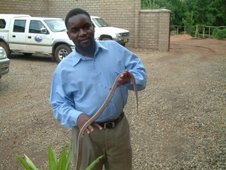This article was published in the Sunday Times of - June 5, 2006
If only Charcoal was banned!
By Hastings Maloya
While we are all watching, our indigenous forests are steadily diminishing. The once beautiful hills and mountains are gradually becoming bare and our good land becoming unproductive due to continuous soil erosion. Siltation in our rivers is becoming an order of the day. Electricity power failures are no longer news.
Malawi is currently facing serious environmental problems with deforestation as the main challenge. It is sad that everyone accepts that the state of affairs is bad but ironically we are aware of the main cause to the situation that we are in. Charcoal production! It is estimated that 140,000 ton of charcoal are produced per year in Malawi.
It is very unfortunate that the presence of illegal indigenous timber from forest reserves and customary areas is too common on our streets and the development is going on without control. Malawi has allowed wanton cutting down of its trees by its own people in the name of livelihood survival for people. Another excuse has been lack of alternative source of energy. Malawians have been made to believe that there is no any other better source of fuel energy but charcoal. We have watched this trend for years and maybe we will wake up for an action when we get to the last tree!
In December 2005, a Coalition of Environmental NGOs in Malawi, cried through its press release that the country lost 2,501,571 ha. of both indigenous and plantation forests between 1972-1992 and much higher values after this period resulting in Malawi having a deforestation rate of 3.5%, the highest in the SADC Region.
In all circles there seem to be nothing happening to tackle the problem, if there has been any effort then it has been painfully very slow. Actually production of charcoal in Malawi is far beyond demand and that is why we have piles and piles of charcoal on the streets. To a certain extent those that are producing charcoal are doing it just for the sake of it, not that they have a ready market.
Driving along the newly christened Robert Mugabe Highway, from Mulanje to Blantyre it is a terrible sight of the hundreds of charcoal bags that are seeing their way into the city. The state of affairs on the Zalewa road is not worth mentioning. It has been said enough. And along the Salima road the situation is the same. How about what seems to be a proper charcoal marketplace at the Machinjiri Turn–off on the Chileka road in Blantyre? Area 23 in Lilongwe. It is all over Malawi and it seems no-body cares.
But by law, charcoal production and sell is illegal in Malawi as stipulated by Section 81 of Malawi’s Forest Act of 1987 which reads: “No person shall make or sell charcoal from indigenous timber or tree except pursuant to a licence issued under this section.” And charcoal producers in Malawi have no licences. Charcoal production in Malawi can only be legal when there is recognised sustainable forest with a management plan as a source of the charcoal.
It has been argued by some quarters that production of charcoal is a source of livelihood and that it should not be banned unless alternatives are found for the people. This is a very poor excuse. Why is it not accepted that all people involved in charcoal are doing an illegal business? And one wonders why there should be alternatives for law breakers. In actual sense, we can hardly found a charcoal producer whose livelihood has improved because of this type of destructive business.
Charcoal suppliers to town remain hanging about dirty through-out the year. Very few of them seem to have taken a shower for a week or so. As a country we should be ashamed of ourselves to clap hands on such poor fellars who are failing to make ends meet and keep on cheating them that they are surviving on charcoal – what type of survival? How many of them will come forward to show us children that are going to school, or some type of beautiful houses that have been built out the charcoal business?
Perhaps because it mainly affects marginalized and poor people, even politicians have taken advantage of the porous situation for political gains. We have heard of politicians shielding the charcoal business people simply to get votes during an election. Some politicians and big business people have actually been seen involved in this illegal trade and are in the forefront saying charcoal can not be banned unless alternative sources of livelihood are found. And yet the longer this problem is ignored, the worse it gets, putting all our futures at risk. It is a tall order to reverse the trend of tens of years, but it has to be done – and done now.
We used to have minibus toots on the streets of Malawi. We used to have street vendors in our towns and cities. They are no longer there. They were operating illegally and had to be shown the exit. And nobody proposed an alternative source of livelihood. What is so special with people that are destructing our environment? If indeed we love mother Malawi, there should be a total ban on charcoal. And this requires a radical approach.
Then there is a question of alternative source of energy. For who? The people that already have the alternative source of energy i.e. electricity are the ones that are buying a lot of charcoal. The literates are the ones in the fore front of the damage. New fuel saving stoves are coming on the market but how many people are buying them? Recently there has been an introduction of a locally made Rocket Stove that has already shown what wonders it can do in saving our forests but how many among the elites have gone for it?
People in the villages have traditional means of using fuel wood and do not talk of charcoal. This tells us that the excuse about alternative source of fuel wood is only a scapegoat in the process of making Malawi bare and unproductive.
Now, Malawi tomorrow joins the international community in commemorating the World Environment Day and this year's theme is Deserts and Desertification with a slogan -Don't Desert Drylands! This follows the designation by the United Nations General Assembly for the year 2006 as the International Year of Deserts and Desertification. In keeping with tradition, United Nations Environmental Programme (UNEP) has chosen the theme for World Environment Day to coincide with the International Year in order to highlight this pressing environmental issue.
Desertification is about land degradation: the loss of the land’s biological productivity, caused by human-induced factors and has potentially devastating consequences in terms of social and economic costs. Malawi is in this situation at the moment.
Surely each one of us would want to know whether it is necessary for Malawi to participate in the commemoration. Time to check if as a nation we are worried that in anyway we are almost deserting our country.
Why not a total ban on charcoal and no excuses about alternatives!
It is said that forests precede civilization, and, deserts follow. It has been so since humanity first settled down from a nomadic life. Written history indicates that some 3,000 years ago Mesopotamia had wonderful cedar forests and excitement in cutting down the wood by its own people led it to becoming a desert today. History will give us a lot of examples but we do not need to go that far when our own Ndirande Mountain can give a good example.
The major reason for the worsening environmental damage in Malawi is therefore not the absence of legislation but laxity in the implementation and enforcement of policies, legislation and strategies by responsible Ministries and Departments
I WELCOME you!
Dear Good People,
I warmly welcome you to my Blog and it is my profound hope that you will find it useful and worth the time you spend on it. On this Blog, I have posted some of the articles and pieces that I have writen just for record purposes and also for sharing. You might have read these articles in the papers but it could also be possible that you missed them.
Please be advised that these are my toughts and purely my opinions. You are free to comment on them and/or to critic them. I will appreciate any of your comments.
Thank You.
Hastings Maloya
+265 888864241 or +265 999950953
I warmly welcome you to my Blog and it is my profound hope that you will find it useful and worth the time you spend on it. On this Blog, I have posted some of the articles and pieces that I have writen just for record purposes and also for sharing. You might have read these articles in the papers but it could also be possible that you missed them.
Please be advised that these are my toughts and purely my opinions. You are free to comment on them and/or to critic them. I will appreciate any of your comments.
Thank You.
Hastings Maloya
+265 888864241 or +265 999950953
About Me
- Hastings A. MALOYA
- Mulanje, Southern Region, Malawi
- Is an experienced journalist, writer, specialist in development communications, public relations, publications, desktop publishing, information technology, photography, environmental education and rural development. Hastings Maloya is currently working as Programme Officer responsible for Environmental Education, Awareness and Communications for the Mulanje Mountain Conservation Trust (MMCT) since September 1, 2002. Hastings, comes from Tradional Authority Mabuka in Mulanje District, is an Adventist Christian, and has two daughters Eva and Eve.
Subscribe to:
Post Comments (Atom)








No comments:
Post a Comment